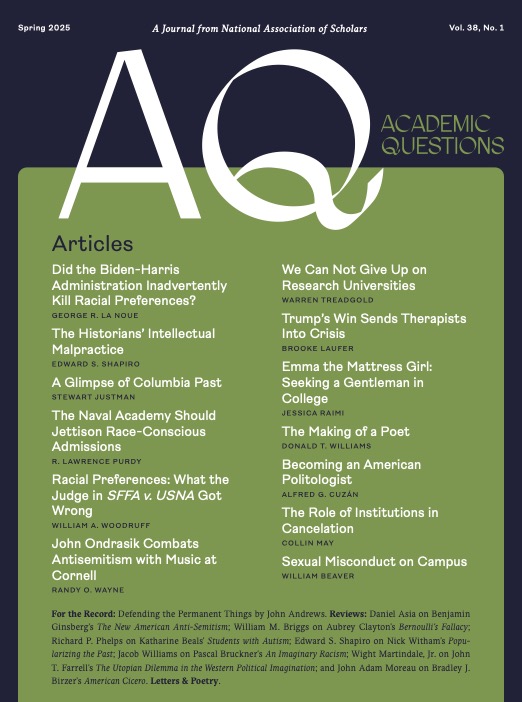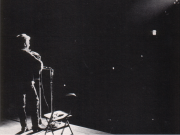When an army of Islamists occupied the plaza at the center of the Columbia campus last year, I took it personally, as if my home had been defaced. But the worst of it was the knowledge that behind the occupiers, also celebrating atrocity and crying for the annihilation of Israel, stood many of the Columbia faculty. The classroom itself had been transformed into a mill of antisemitic propaganda. The vision of Columbia University, where I received both a B.A. and a Ph.D., becoming a Hooverville of barbarism and a twisted mockery of itself, has made me reflect on my years there. Ironically enough, I learned to think at the same institution where many of the fanatics on Low Plaza learned their rhetoric.
I don’t mean I was preached to, lectured, or harangued about what it means to think. The sort of instruction I received went much deeper than that. By practice and example, not decree, I learned that no conclusion for which I might be arguing was already given. Conclusions need to be established, and in so doing one takes responsibility for them. Perhaps my teachers held freedom of thought as a first principle not only for abstract reasons but because even in the 1960’s the memory of the left’s embrace of Stalinism remained painful and chastening. Partisan Review, the influential journal of the arts and opinion with ties to Columbia, set its course and found its voice only when it declared independence from Moscow in the latter 1930’s. In ways I could not have understood in real time, this history flowed into a course at Columbia that remains with me even now.
When I took my seat in a class in English Composition at Columbia in the fall of 1966, I was confronted by an assured doctoral student who smoked somewhat theatrically in front of us. Only fifty years later did I learn something of his backstory.1
Stephen Donadio grew up in Brooklyn, the child of second-generation Italian immigrants. When he was eleven years old, his father fell ill of a terrible disease that sounds all too much like ALS, and the family soon found itself in poverty, dependent on welfare and his mother’s earnings as a seamstress. Upon graduating from high school Donadio had not a cent to his name and could not have managed to visit a college any distance from New York, much less attend one. Nevertheless, in 1959 a scholarship endowed by two Jews, and awarded to him without ceremony, without strings, and without regard to religion, enabled him to attend Brandeis University in the lowlands a few miles from Harvard.
Irving Howe, under whom Donadio studied at Brandeis, mentions in his intellectual autobiography Harvard’s disdain of “the antics of the new Jewish school” in its vicinity.2 But what looked to Harvard gentility like uncouth behavior could also be described as an outbreak of life itself. At Brandeis Donadio encountered an intellectual ferment of an intensity to be found perhaps nowhere else in the United States—a storm of ideas, and not just ideas on the page or in the air, but embodied and voiced. As if the 1960’s had arrived before the fact, albeit without the street-dancing, here were Herbert Marcuse, Angela Davis, Abbie Hoffman. But here also, besides Howe, were Hannah Arendt, Robert Lowell, Norman Mailer, Norman Podhoretz, Philip Rahv. As Donadio later wrote, “The campus was alive with contending philosophical, political, literary and aesthetic notions, each of them demanding its due, and there was no one willing to surrender.” A student at Brandeis would have acquired a strong sense that ideas exist in conflict and that no one can pretend that his or her position has already been established beyond dispute. In requiring freshmen at Columbia to take responsibility for their conclusions by constructing them with due clarity and care, Donadio was not following some faculty handbook but acting on principles that were surely already his own as a result of his years at Brandeis.
There was good reason ideas were exchanged at Brandeis as if issues were alive and conclusions not yet settled. When Donadio entered in 1959, Brandeis itself was still new and therefore did not have the consensus of a long-established institution to fall back on. It had been founded, like the state of Israel, in 1948 and, enriched as it was by the presence of both students and faculty who would not have been welcome elsewhere on account of their religion or the irregularities of their education, its existence carried a kind of implied allusion to “the Zionist entity,” in the parlance of today’s eliminationists. Where else would someone who spoke English with a thick accent like Rahv (born Fevel Greenberg in Ukraine) have belonged to a department of English? It says much that Donadio applied to Brandeis because of Rahv, and that Rahv, who had lived in Palestine in the 1920’s and whose mother was a fervent Zionist, left a million dollars to the state of Israel upon his death in 1973.3
In Donadio’s classroom it was as if I were attending Brandeis, the Israel of universities, at one remove. In effect, we were to form our conclusions with enough care and state them with enough style to survive a contest where “there was none willing to surrender.” As if to remind us to pretend to be adults, we were all called “Mr.” And to take down our pretensions as well as show what it means to stand behind one’s words, Donadio placed before us a most unusual text.
On the first day of class, upon entering the room in Hamilton Hall (the building occupied by black students in 1968 and Islamists in 2024), we found on our desks Orwell’s Road to Wigan Pier, a genre-less work few if any of us knew of, part report on coal-mining, part autobiography, part polemic on social justice. Two characteristics of this unique volume made it an inspired choice for a course in writing. First, in order for Orwell to report on coal he had to descend into the mines, and so this is a work argued quite literally from the ground up. Second, its strikingly original (but never pretentious) phrasing attests that the author has consciously chosen every word. A decade later Orwell would argue in his most celebrated essay, “Politics and the English Language,” that only by the exercise of choice can the writer on topical questions avoid falling into the habits of automatism. In this light, The Road to Wigan Pier is a course in resistance to robotic thought, like the incantations of Jew-hatred that rang out recently in Low Plaza, so reminiscent of the chants against Goldstein, a Jew himself, in Nineteen Eighty-four.
But it was not only the vigor and uncompromising clarity of Orwell’s prose that drove home our duty to think for ourselves. So did his stance as a socialist who does not speak like a right-thinking socialist. (“As with the Christian religion, the worst advertisement for Socialism is its adherents.”) As a young man Orwell served in the imperial police in Burma, an agent of brute oppression. In horror at what he had done, and in the belief that capitalism had reached its final crisis, he thereafter took the side of the oppressed, but without subordinating himself to a Communist Party supposedly at the forefront of history. He was too much of a freethinker for that. A member of the left who was also a scourge of the left, he advances in The Road to Wigan a heterodox argument for socialism, so heterodox that the publisher who commissioned the book for the Left Book Club in 1937 (Victor Gollancz) attached a foreword pointing out and deploring Orwell’s several heresies. This strange document ought to be enough to cure any freshman of the notion of subscribing to a line that requires the “surrender” of one’s mind.
As proof of Orwell’s willful blindness to the glories of existing socialism, Gollancz cites “the achievements of the Soviet Union [which] are there for everyone to see.”4 According to the Black Book of Communism, between August 28 and December 15 of 1937 alone, 22,500 were executed in Moscow and another 16,600 deported to prison camps, to be executed over time.5 With his servile defense of the Soviet Union in the midst of the Great Terror, Gollancz brings to mind the academic apologist for mass murder in “Politics and the English Language” who argues, if it can be called an argument, that “the rigors which the Russian people have been called upon to undergo have been amply justified in the sphere of concrete achievement.”
The very idiom of The Road to Wigan Pier flies a warning against such noxious gas. And this is a work to which Donadio was linked by association. The fact is that Rahv—the freethinking defender and brilliant critic of literature who drew Donadio to Brandeis to begin with—not only admired Orwell deeply but co-founded and co-edited Partisan Review, for which Orwell wrote. (Other contributors, including Donadio himself, could be found in Hamilton Hall.) Moreover, the year in which Partisan Review repudiated Stalinism—1937—was also the publication date of The Road to Wigan Pier. Orwell’s independence in Wigan Pier—his insistence on seeing for himself and thinking his own thoughts—resonates with the independence of viewpoint that distinguished Partisan Review and, in a different way, Rahv. When I came to re-read Wigan Pier some fifteen years after freshman English, I found that I remembered it in detail, no doubt because of its stunning clarity, but possibly also because I read it originally under the tutelage of one for whom it meant something.
That English composition was then a required course throughout the United States made the students who took it a captive audience for any zealous young instructor who might like to proselytize them. Within a few years of my own composition class, universities across the land, shaken by the turmoil of the 1960’s, were entertaining proposals to cut down the numbers of graduate students in English teaching composition.6
Stephen Donadio did not proselytize. If he had been so inclined, he could have had us eating out of his hand. He was not so inclined. He did not enlist us in some cause of his own. He did not, for example, preach social justice with Wigan Pier as his text. For that matter, neither did he tell us how to interpret Orwell’s open derision of free love, pacifism, sandal-wearing, uncut hair, and other causes and customs of the mad decade we were at that moment in the middle of. He merely required us to write as if our conclusions were not already given.
In a searching essay on Orwell written as an introduction to Homage to Catalonia, Lionel Trilling tells of a graduate student who came to him one day with the idea of writing about Orwell, unaware that Trilling was even then doing just that. Trilling never suggested the student’s project and never proposed a line of inquiry or discussion when he came to learn of it. He kept his ideas about Orwell to himself, not wanting to “dissipate” them in conversation, as he puts it.7 Incidentally, the information provided about Orwell’s life in Trilling’s introduction to Homage to Catalonia comes straight from The Road to Wigan Pier.
I received a Ph.D. in English Literature from Columbia in 1976, one year after Trilling’s death and two years before the publication of Orientalism by his successor as the reigning intellect at Columbia, Edward Said. Said came to have legions of followers, some of whom doubtless later camped on Low Plaza. Trilling, whose middle name was reportedly Mordecai,8 sought no followers and spoke in subtleties that do not inspire movements. I studied with neither, and my teachers were disciples of neither; an eclectic lot, they were too independent to be disciples of anyone. What they had in common was a practice of reading sensitively, without fixed ideas or ideological labels, opening up works of literature themselves.
In a manifesto of intellectual freedom published in 1937, the editors of Partisan Review declared, “Conformity to a given social ideology or to a prescribed attitude or technique, will not be asked of our writers.”9 My teachers at Columbia did not prescribe anything beyond careful reading and fair argument. From introductory courses through doctoral study, from composition to dissertation, not one of them so much as suggested a thesis to me. Never was I told what I was expected to say. It was my responsibility to follow the evidence and defend my conclusions, and I would be judged on how well I did it.
Students were assumed to be self-directed, and if they weren’t (and sometimes even if they were), they were lost. This demanding ethos of intellectual freedom and responsibility was no mere pretense or formality, and many of my teachers appeared so committed to it that the very notion of indoctrinating students must have been repugnant to them. Together they succeeded in making it morally impossible for me to accept a prescribed conclusion to this day.
By now, much of the professoriate has abandoned nonprescriptive instruction as if it were some liberal piety of a discredited past. In the ideological classroom every conclusion is given in advance, and practices that might otherwise give pause are sacralized by the imaginary imperatives of social justice. Hence all those now using the classroom to sow hatred of Jews under the color of anti-colonialism. It is this movement that authorized and emboldened the Islamists on Low Plaza chanting death to the Jews in the manner of Party members in Nineteen Eighty-four who live, Orwell says, “in a continual frenzy of hatred of foreign enemies and internal traitors”—Jews being both.
Descending into hell in Nineteen Eighty-four, Orwell portrays the scene as vividly and circumstantially as a filthy table or a miner’s toil in Wigan Pier. Despite its descriptive power, though, Orwell did not write Nineteen Eighty-four to reveal the future awaiting the West like the monstrous conclusion to history. He wrote it precisely because he believed the future depicted in its pages was not destined to occur and could be averted by a forewarned citizenry. As Rahv noted in a 1949 review that still stands among the most trenchant discussions of Nineteen Eighty-four,
To read this novel simply as a flat prediction of what is to come is to misread it. It is not a writ of fatalism to bind our wills. Orwell makes no attempt to persuade us, for instance, that the English-speaking nations will inevitably lose their freedom in spite of their vigorous democratic temper and libertarian traditions. "Wave of the future" notions are alien to Orwell. His intention, rather, is to prod the Western world into a more conscious and militant resistance to the totalitarian virus to which it is now exposed.10
By contrast, the self-declared “progressives” on American campuses who curse Israel as an occupying power present themselves as, indeed, the wave of the future. With their favorite chant—“From the river to the sea, Palestine will be free”—they let it be known that history has passed a death sentence on the nation of Israel. For these fanatics the extinction of Israel represents a moral imperative that overrides all lesser considerations, including, of course, our libertarian traditions.
Learning to question prescribed conclusions may not sound like much. However, in the face of an ideology that prescribes a second Holocaust, it is everything.
Stewart Justman is professor of English, emeritus, at the University of Montana; [email protected]. He last appeared in Academic Questions in 2015 with “The Medicalization of Misspelling: DSM and the Management of Life."
1 See Brandeis Magazine (Winter 2016/2017), https://www.brandeis.edu/magazine/2017/winter/featured-stories/sidebar-stories/donadio-speech.html.
2 Irving Howe, A Margin of Hope: An Intellectual Autobiography (New York: Harcourt Brace Jovanovich, 1982), 191.
3 Jeffrey Meyers, “The Transformations of Philip Rahv,” Salmagundi 202/203 (2019): 206.
4 Victor Gollancz, Foreword to The Road to Wigan Pier (New York: Harcourt Brace Jovanovich, 1958), xviii.
5 Stephane Courtois, Nicolas Werth, Jean-Louis Panné, Andrzej Paczkowski, Karel Bartosek, Jean-Louis Margolin, The Black Book of Communism: Crimes, Terror, Repression (Cambridge, MA: Harvard University Press, 1999), 187.
6 Carl Woodring, Literature: An Embattled Profession (New York: Columbia University Press, 1999), 62.
7 Lionel Trilling, Introduction to Homage to Catalonia (New York: Harcourt Brace Jovanovich, 1952), vii.
8 Steven Kellman, “Mulling Trilling,” Hopscotch: A Cultural Review 2 (2001): 134.
9 Editorial Statement, Partisan Review 4 (1937): 4.
10 Philip Rahv, “The Unfuture of Utopia,” Partisan Review 16 (1949): 746.
Photo by Gabriel Almanzar on Unsplash














